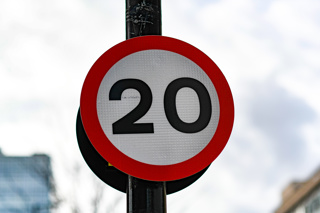Careless drivers who put other road users at risk by committing offences such as tailgating or poor lane discipline will face on-the-spot penalties from today (August 16).
The changes give the police greater flexibility in dealing with less serious careless driving offences, freeing them from resource-intensive court processes, but could result in company car drivers totting up penalty points as punishment doesn't have to go through the courts.
Existing fixed penalty levels for most motoring offences - including using a mobile phone at the wheel and not wearing a seatbelt - rise to £100, bringing them into line with penalties for similar non-motoring fixed penalties.
Road safety minister Stephen Hammond said: "Careless driving puts innocent people’s lives at risk – that is why we have made it easier for the police to tackle problem drivers by allowing them to immediately issue a fixed penalty notice for low level offending rather than taking these offenders to court.
"We have also increased penalties for a range of driving offences to a level which reflects their seriousness and which will ensure that they are consistent with other similar penalty offences."
The fixed penalty for careless driving is now £100 with three points on the driver’s licence. The most serious examples will continue to go through court, where offenders may face higher penalties.
The police will also be able to offer educational training as an alternative to endorsement. Drivers will still be able to appeal any decision in court.
Fixed penalty levels for most of these motoring offences have not increased since 2000, making them lower than other penalties of a similar severity.
The changes – which were announced earlier this year – are being introduced following extensive public consultation with road safety groups and police forces.
The Road Haulage Association has welcomed the new penalties.
"This is good news for all road users," said RHA Chief Executive Geoff Dunning. "The UK road network is among the most congested in Europe. As traffic levels continue to rise, it is inevitable that there will be a corresponding increase in traffic incidents. Careless driving is a major cause of crashes and we hope that the new police powers will go a long way to reducing this situation."
Julie Townsend, deputy chief executive, Brake, the road safety charity, also wwelcomed the move, but warned the new penalties weren't enough of a deterrent.
"Driving is the most dangerous thing most of us do on a daily basis," she said, "But sadly some drivers remain complacent about the risks and the law.
"Bad driving causes deaths and life-changing injuries that tear families apart and affect whole communities. All drivers have a responsibility to ensure they aren't putting others at risk, and are helping to prevent these needless casualties."
"They can do this by following simple principles, such as slowing down, giving the road their full attention, always belting up, and never driving impaired. We hope today's changes will help to improve driver attitudes and behaviour. But we are concerned penalties still aren't nearly high enough to deter all bad drivers and reflect the potentially appalling consequences of bad driving."






















Tony - 16/08/2013 11:19
what about lorries overtaking at 1mph faster and taking forever to overtake another lorry